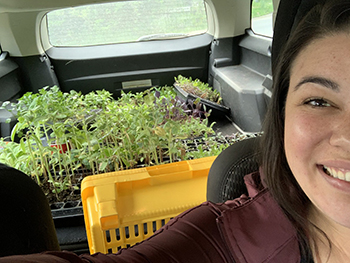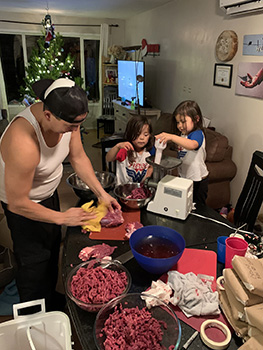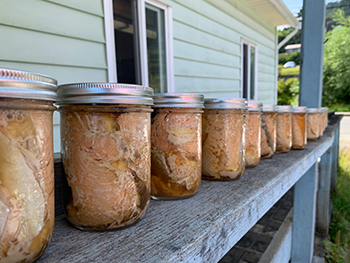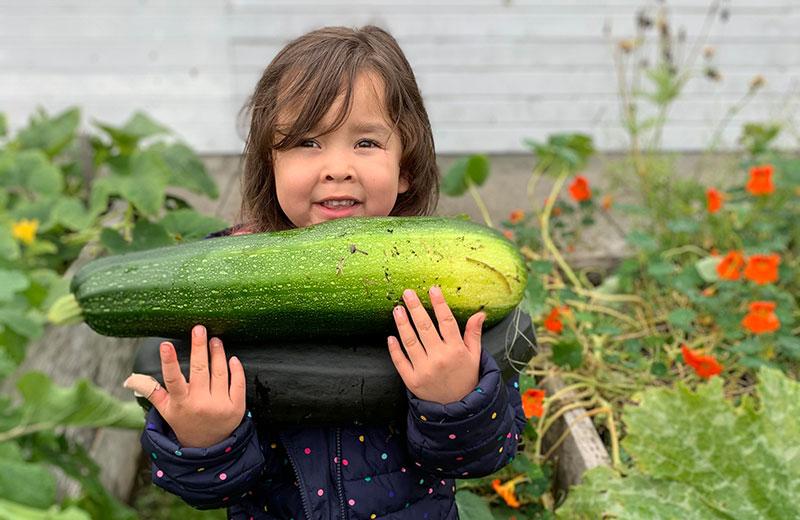March is Nutrition Month. Each year I think about how to include campaign messages into my work as a dietitian. Often, it’s a bit of a stretch! This year’s theme recognizes how important culture and food traditions are to defining healthy eating. As a white settler/uninvited guest who has worked for the past 15 years on the traditional and unceded lands of the Haida people, I understand that acknowledging, respecting, and supporting local food practices is key to health and wellness.
I have had the good fortune to meet many Haida residents who have taught me so much about how culture and health are connected. One such person is Gaadgaas Erika Stocker. Erika is from the Yahgulaanas Raven clan from Masset and lives in Skidegate. I first met Erika three years ago when I interviewed her for the Southend Pantry Coordinator position.
I remember she came in with all her warm clothes on and said she was packing up her family to go to Copper Bay for the weekend. She spoke about how important food was to her, her family and her community.

“In the olden days people moved around the island a lot, moved from village to village to harvest food. This still happens; people still travel to Copper Bay or camp at Yakoun River. This way of life brings such a closeness to the land.”
I knew then that she would be perfect for the job! Since then, we’ve had many opportunities to work together. I recently connected with Erika to explore the meaning of food for her. She told me she was working on her Auntie Sibby’s halibut and cod soufflé as we talked, as the freezer door had been left open and some fish thawed. They were cooking it up so it wouldn’t be wasted!
Food supports family life
Erika shared that food is part of every aspect of her life:

“It is a pretty big deal in my world. Shane (Erika’s husband, who is a Tanu wolf member from Skidegate) learned from his Tsinaay (Haida term for grandfather) how to hunt, harvest, preserve and our world revolves around it. It makes life so busy. There is always something to work on, whether its fish, deer, scallops or so many other things. I enjoy the food from our own territory – it makes me feel whole and healthy.”
Erika and Shane include their daughters, Eliza Irene and Nora Rose Collinson, in all aspects of their food world.
“My kids eat so much food from the land - they are healthy and springy. They started eating traditional food as soon as they started eating solid foods. Black cod was Eliza’s first food—she ate a lot of it! She would have fish grease smeared all over her face!”
“We are teaching them the skills to take good care of themselves. When we are working on food, there is so much joy and laughter… so much love. “
Food supports community life
As a pantry coordinator for the Local Food 2 School Initiative, Erika supplies food to many public organizations, including schools, youth centers, Haida Child and Family programing, elders programs, and hospitals. She enjoys the collaboration with so many organizations on island working towards a Haida Gwaii Food Strategy. She sees how it supports the well-being of the whole island, especially the next generation.
“When I was cooking at Sk’aadgaa Naay Elementary School, I created menus around the venison and halibut we had. We would make butter chicken, but use halibut or deer. The kids would line up to get seconds and you know they loved it. They were so engaged in all aspects of the food including cutting the fish or butchering the deer. “
Food supports more than physical health
Erika recognizes that food is about more than healthy eating. In her second job, as an Aboriginal Justice Worker, she uses food in practical and positive ways to help people move forward.
“I like blending my two roles. When I have Restorative Justice (RJ) clients that need to serve community hours, they help with community food work. I have had women help plant and dig potatoes in the community garden. I have also worked with clients to hunt deer and donate it to the elders or schools programs. Blending the roles helps RJ clients to build new positive relationships in the community or work on the land. Many of our people have harvesting skills to share so it is a win-win situation.”

While she acknowledges that harvesting local food requires many resources, including equipment like boats, fishing nets, jars, freezers, warm clothes, skills (e.g. harvesting, food preservation, food safety), and time, Erika notes it offers many benefits.
“Although it costs money to harvest food, we also save money because we don’t have to buy commercial meat that is so expensive. This works allows us to connect with the land, ocean, and our cultural traditions so much—it fills me with reverence and gratitude.”
Speaking with Erika, I reflect on the deep meanings that food holds for her, her family and her community. I am grateful to walk with her as she infuses our shared work with the traditional knowledge and practices of her ancestors. She brings joy, resilience, and hope to the work!














Comments